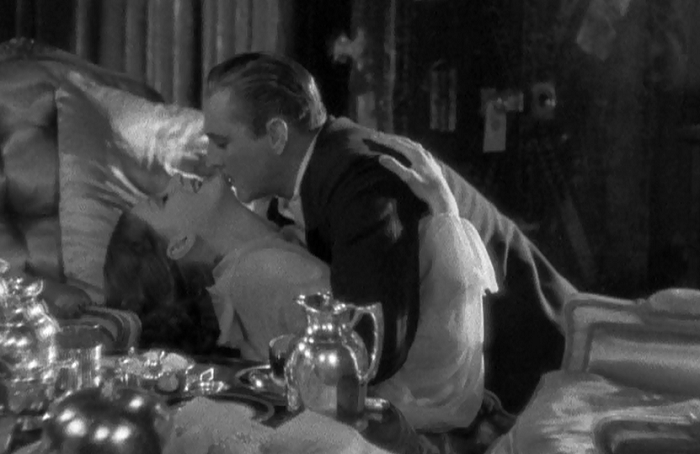
Proof That It’s Pre-Code
- All the usual hotel nighttime activities.
- There’s an extended subplot about an industrialist negotiating with a stenographer about what she will give him in exchange for an all-expense paid trip through Europe. It includes this wonderful line:
“I don’t suppose you’d take some… dictation from me sometime.”
The Particulars of the Picture
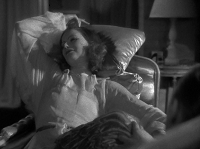 |
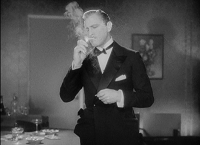 |
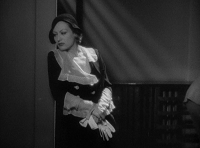 |
| Grusinskaya … Greta Garbo |
The Baron … John Barrymore |
Flaemmchen … Joan Crawford |
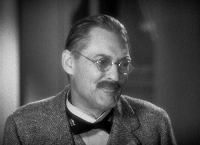 |
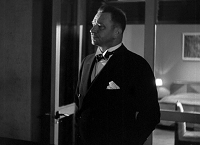 |
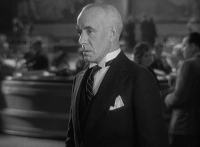 |
| Otto Kringelein … Lionel Barrymore |
Preysing … Wallace Beery |
Doctor Otternschlag … Lewis Stone |
Grand Hotel: More Stars Than There Are in the Heavens
‘Don’t put more than two stars in a movie,’ was the conventional wisdom at the movie studios in the 1930’s. You can only use two stars for the production to be cost effective.
Irving Thalberg, MGM’s Head of Production, thought it was time to buck that trend when the script for Grand Hotel came across his desk. For it, he gathered some of the biggest stars that MGM had in its stable and some of its best behind-the-scenes talent and let loose. There are no small parts here, as this tale is the closest to pure distilled MGM glamor as anyone could assemble.
Set in the most expensive four star hotel in Berlin, the film opens with a series of phone calls that give us an idea of the plots we’ll be juggling. With five major characters in five separate hotel rooms all in a row, each has their own endgame for extracting some measure of happiness from their stays.
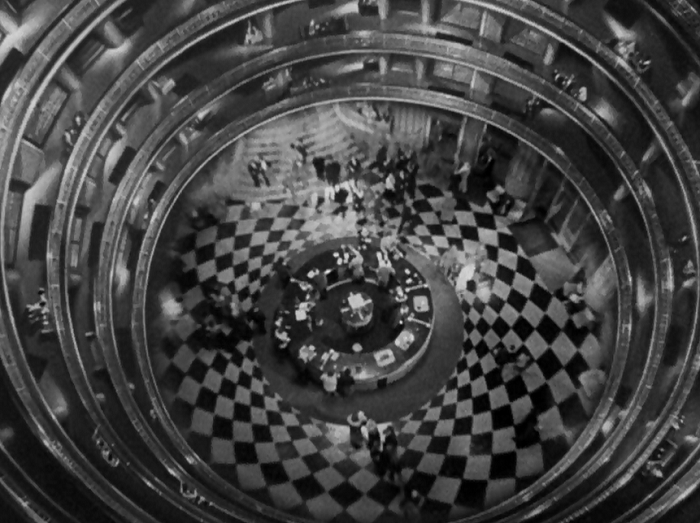
Grand, sure. But the room service still costs an arm and a leg!
First is Kringelein (Lionel Barrymore), an older man who’s spent most of his life slaving away in a textile factory. Upon discovering that his death appears to be eminent, he cashes in his funds in order to spend the rest of his days in the lap of luxury. He’s neurotic to a ‘T’, though, obsessed with getting the most out of life even though it’s obvious he has no idea how.
For this he turns to The Baron (John Barrymore), a smooth player who knows how to talk to the ladies and wrack up the gambling debts. He’s generous and kind to a fault, but he hides a dark secret: he’s one of those charming gentlemen thieves you hate to love. The only way to repay his debts is by robbing a beautiful pearl necklace from an overemotional ballerina a few doors over.
This happens to be Grusinskaya (Greta Garbo), an older dancer who is beginning to have her panic attacks affect her performances. The venues she plays at in Berlin aren’t selling out either, only complicating her worries. After she accidentally catches the Baron in her room attempting a robbery, he brightens her mood and they quickly fall in love.
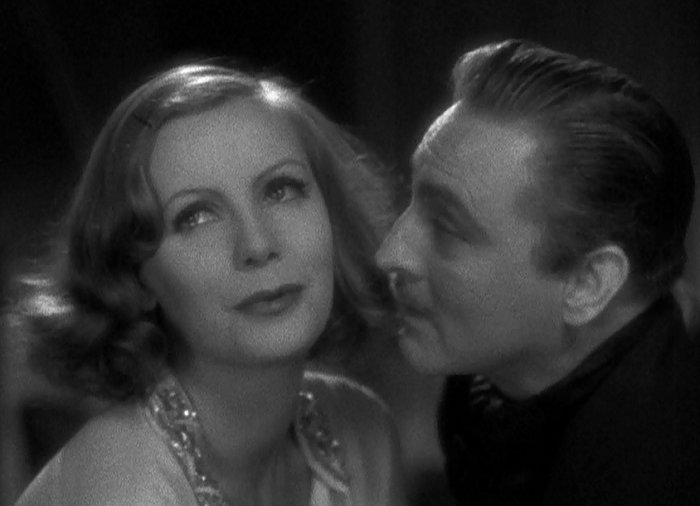
For example.
This puts off the other woman that the Baron was flirting with, a stenographer named Flaemmchen (Joan Crawford). She’s also of a sad sort, working for pennies and picking up spare money as an artist’s model. Flaemmchen is desperate to escape her situation, and, after the Baron falls in a legit form of love, she resigns herself to prostitution.
Not the cheap on the street kind, though. An industrialist visiting Berlin, Preysing (Wallace Beery), is desperately trying to negotiate a merger to save his textile company from ruin. He prides himself on his honesty, but may have to sacrifice that for his future’s sake, and his wife’s as well. Preysing promises Flaemmchen riches for her body, and she seems to see this as an inevitability. He also used to be Kringelein’s boss, and is temperamental as hell.
There are two other minor characters to round things out. Doctor Otternschlag serves as the film’s laconic disbeliever, who treats his life like a burden. Half of his face is burned in a horrible scar after an accident during the war, and thus works at the hotel as a way to hide a way from real life and pretend that it ended with the war. There’s also the lead porter, Senf (Jean Hersholt), who spends much of the film anguishing over the fate of his pregnant wife. I’ll talk about both of them a bit more below.
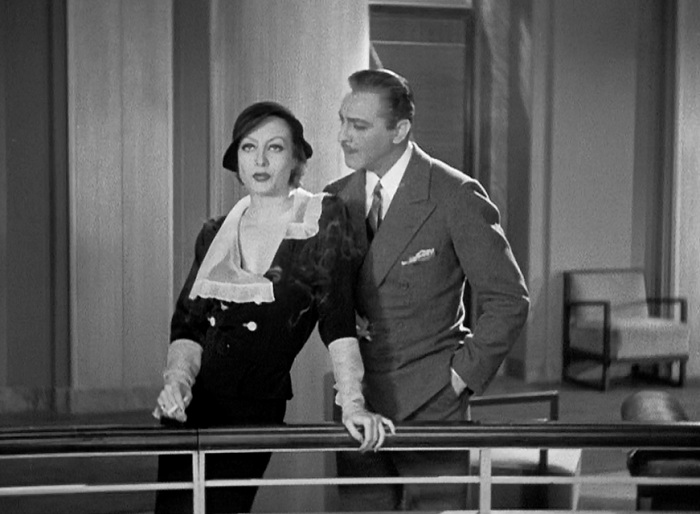
In one early, dizzying scene, Crawford and Barrymore dance around each other as their innuendos and flirtations bounce around with glee.
There are many little relationships throughout the film, but the most enchanting is watching Lionel and John Barrymore bounce off each other. While the two play fast friends, there’s enough brotherly love that slips through that give those scenes an extra spark.
Joan Crawford, who I’ve noted before took a while to warm up to talkies, is wonderful here, imbuing her part with a mix of sadness and hope that the movie isn’t strong enough to get a handle on. Since this is such a big picture, a lot of the more unseemly implications of her later decisions apparently ended on the cutting room floor; in spite of that, Crawford shines.
That being said, Greta Garbo offers less to look at. Mick LaSalle once wrote that it’s impossible to appreciate Garbo unless you see her in a theater, in which case her aura becomes majestic. Since the odds of that happening this day and age seem slim, Garbo nowadays feels less like one of the great stars of Hollywood and more like Carole Lombard with a stiff accent. Her part is certainly one of the more heartbreaking in the film, and her chemistry with John Barrymore helps quite a bit. But without him, the surly routine just drags.
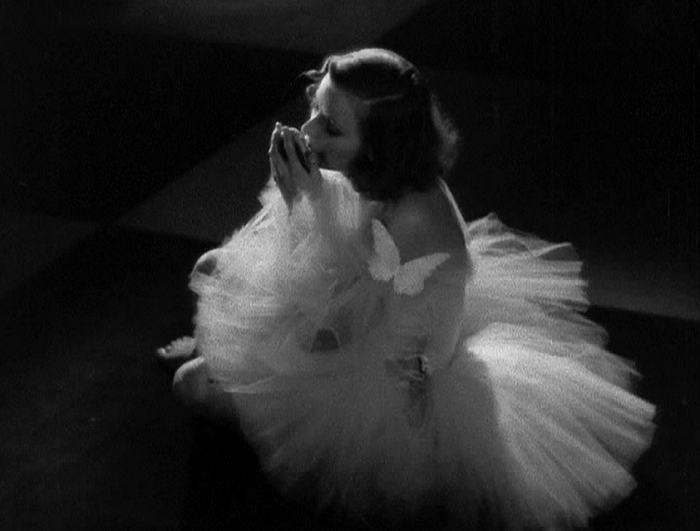
I get it, you like shoes! Who doesn’t!
And, yes, this is the movie where she famously croons to a cadre of handlers, “I want to be alone.” Or, “I vant to be alone.” It’s iconic because of Garbo’s famous recalcitrance, and not so much of anything else to do with the movie. I mention this because it almost seems legally necessary since that single line has probably outlived the memory of this film.
Wallace Beery probably has the most thankless role since he’s probably the least well-remembered of the principals. Preysing walks a fine line between desperation and hedonism, and evokes sympathy even though his temper and egotism make him into an easily definable monster. Beery’s accent is ludicrous, though, which doesn’t help.
Reading different reviews online, I found it interesting that no two seemed to agree on which actor succeeded, nor even which actor is the weak link. Some hated Lionel, others thought he was the audience’s point of sympathy. Beery was either overacting or the main attraction. Others fell in love with Garbo, and others were delighted by Crawford.
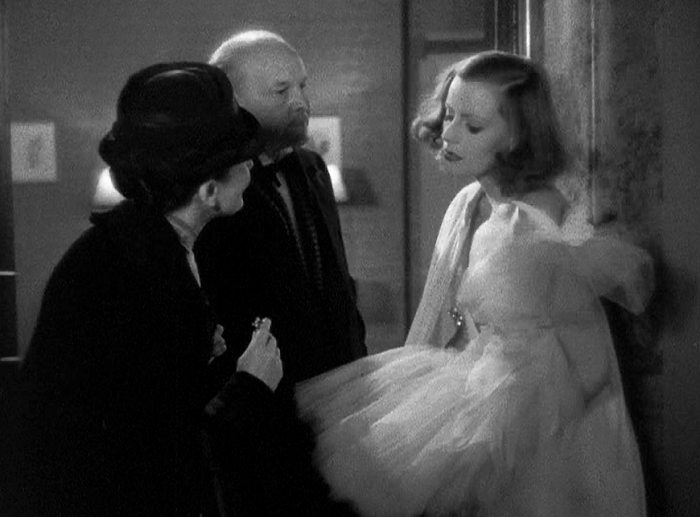
I know, you want to be alone. Well what about what I want, dammit?
John Barrymore was the only actor with whom all to agree upon, and the reason seems to obvious. Despite the fact that Kringelein is the noveau rich in this opulent place or that Flaemmchen has the more tragic story going on, neither engage with the audience’s sense of morality or fair play like Barrymore’s Baron.
I’m going to discuss spoilers here for a bit. Skip down below to where it says (Spoilers are finished) if you want to remain clean.
The Baron is the film’s conscious, the everyman in dire financial straits whose sudden discovery of love instantly reforms him. He is the enforcer of good, and his eventual demise at the hands of the villain is meaningless rather than redemptive. It spurs on Krigelein and Flaemmchen to come together, but even that isn’t a joyous connection.
The characters are all fairly reflective of German opulence of the time, and it’s easy to see that each could stand for a different strata of society. Kringelein is the lonely, despondent older generation, who has seen his way of life erode away. Flaemmchen is the young, newer generation who have no choice but to sell themselves to achieve security. They will eventually use each other for solace, but it’s a flimsy thing born out of desperation and kindness. Eventually (and possibly soon) Kringelein will die, and Flaemmchen will be left again at the mercy of the streets.
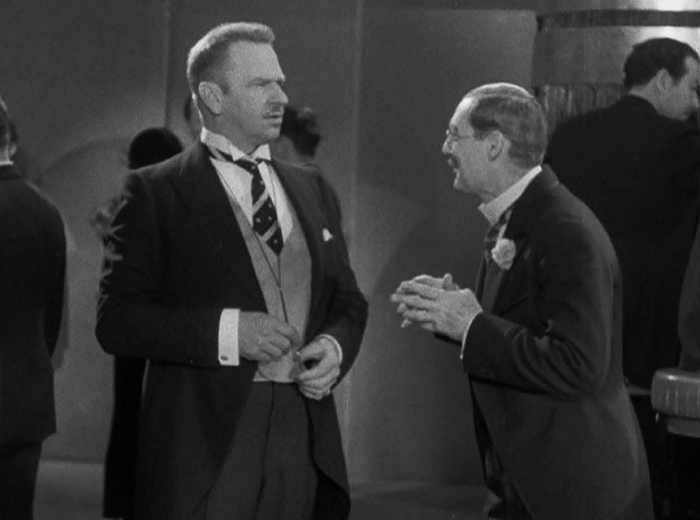
Beery’s glare and attempts to get Kringelein out of the way are some really great heavy work.
Preysing, meanwhile, is easily corrupted and prone to violence and sadism; his murder of virtual everyman John Barrymore isn’t just tragic because of the connections it ends, but because it represents the rich snuffing out those simply trying to get by honorably. It’s a common theme in Pre-Code, and touches on Depression Era anxieties that a capitalist society is weighted severely against the little guy.
That takes me to my next conclusion, that the hotel can be taken to represent life itself. The Doctor famously observes at the beginning, “People coming, people going. Nothing ever happens,” which run parallel to our place in the universe. We check in, we stay, a bit, and then we depart for the unknown. It’s a bit scary and sad, and the Doctor’s job there speaks to how much the Doctor simply refuses to participate in the world he inhabits.
The ending gives a few characters what they wanted, but not in the way they wanted it. Krigelein’s loneliness is satiated, but only by a person doing it out of sympathy rather than love. Flaemmchen also gets what she wants, but not with who she wants it. Grusinskaya gets to live in her delusions a bit longer, and Preysing’s cheating will soon destroy all that he’s built.
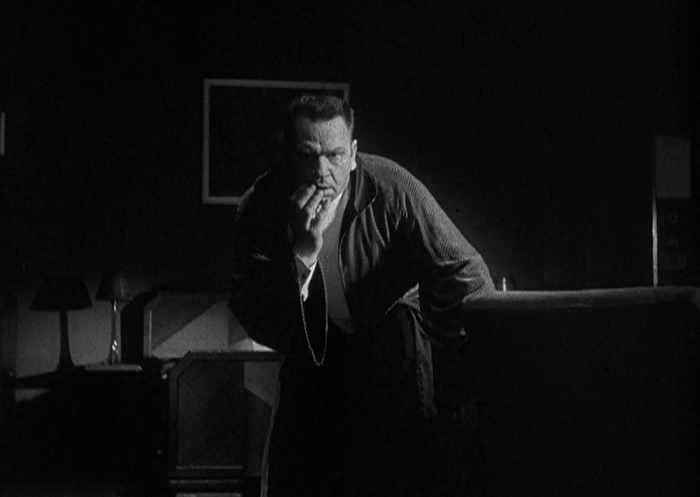
Not pictured: every thing he has built being destroyed.
Even the Baron, whose body is carried out the back, gets one final indignity. The hotel, wishing to immediately separate itself from a customer who turns out to have been a thief, has his beloved pet dachshund dragged out of the lobby, with a sweeper accidentally smacking it on the rear on its way out. It’s almost literally sweeping the Baron’s stay under the rug.
But the final twist comes in the final few minutes, as Sanf finally receives word that his wife is fine and he is a proud new father. The hotel will soon have a new resident, but, like all hotel residents, he will only stay for a little while.
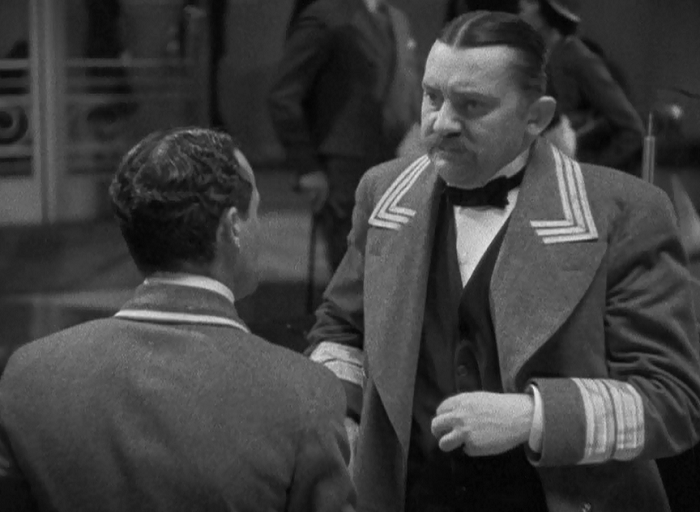
“I’m having a baby! … well, okay, yes my wife is *technically* having the baby… look, I’m just excited, lay off.”
(Finished with Spoilers)
Director Edmund Goulding is incredibly playful with his staging. The film noticeably contains an extended tracking shot, moving between different people as they come up to talk to the receptionists in the luxurious lobby. This is followed by our trip up to the sixth floor, where the balcony serves as a stage for the actors to play around in front of.
Goulding trusts his star wattage to let him be more adventurous with his staging than most of his contemporaries, with several sequences having actors with their back to the camera, or having parallel movements between two different plots occur.
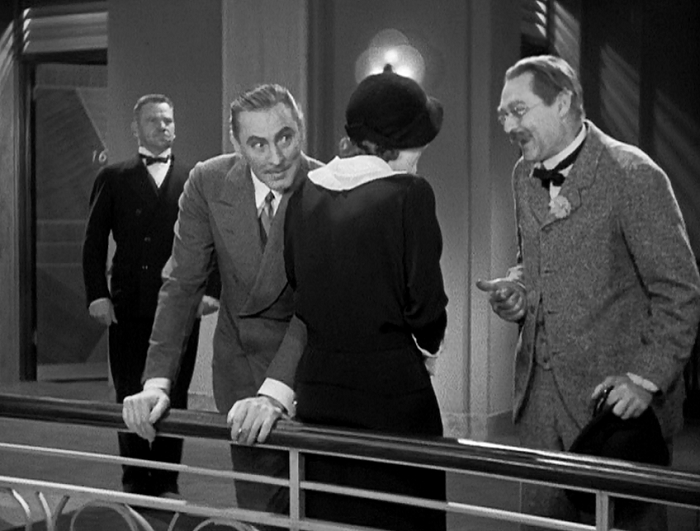
This composition is so much fun and free that it made me giddy to watch.
The soundtrack is a wide variety of waltzes, and the cinematography is unbelievably crisp. The hotel itself is an art deco masterpiece of set design, so much so I’ve seen several comments online asking where they can visit it at!
Grand Hotel suffers from its own lumpiness, sometimes zipping and other times simply milling about. While the film is filled with great actors, it’s hard to shake the feeling that you’re not watching a movie but a series of moments of these people simply acting at one another. It’s big and luxurious, but empty and safe. It influenced a lot of movies that came after it, but is barely remembered today.
AKA the ideal Best Picture Winner.
Trivia & Links
- If you get the DVD of this, there’s a pretty nice documentary called Checking Out: Grand Hotel about the film in the special features that covers a lot of trivia and background. Not that I won’t hit some of it here, but it covers a lot of what made the movie so special back in its day.
- The first and most noticeable thing about the picture is that its two female stars, Crawford and Garbo, don’t share any scenes together, as the studio was worried about one upstaging the other. In fact, the documentary in the last note pointed out that the original cut of the film was three hours long and offered quite a bit more Crawford; realizing it was better to make Garbo happy than Crawford, they edited Crawford’s stuff down and shot some more footage of Garbo.
- It probably didn’t help that Crawford may have been one of the craziest starlets around. Apparently between takes, knowing that Garbo detested tardiness and Marlene Dietrich (quite a combo, that), Crawford would show up for her scenes late and play Dietrich’s records loudly. It’s always weird when someone like Crawford makes acting seem less like a collaboration and more like a boxing match, but, hey, I guess whatever works.
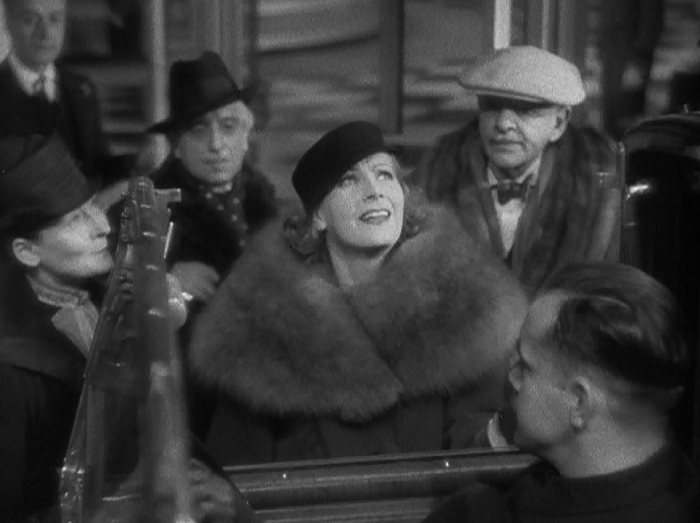
Garbo, at the end of the film. And probably the end of the filming as well.
- Grand Hotel won Best Picture the year it came out, but, surprisingly, none of the actors in the film were even nominated. It is the only film to win Best Picture that got absolute no other nominations. None.
- Wallace Beery did this film on a guarantee that he’d be the only actor to do a German accent. I can’t even imagine the thought process that went into that, let alone upon viewing of the results.
- The movie is based on a book by Vicki Baum entitled Menschen im Hotel (literally “People At A Hotel” (thanks Marco!)), which she wrote after being a chambermaid in a pair of high class Berlin hotels. MGM bought the rights and put it on Broadway first, making a profit on the property and creating interest before the movie had even been cast.
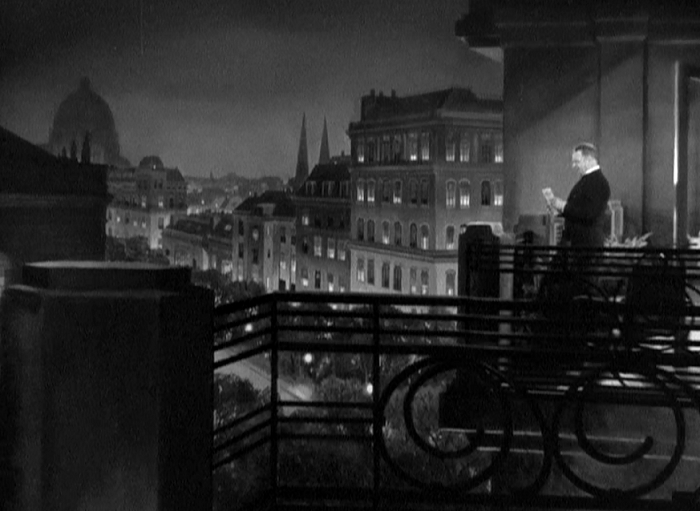
The film does an excellent job opening up the play even without ever leaving the premises of the hotel.
- I usually find original casting info to be kind of pointless, though this one had a pair of doozies: original considerations had Buster Keaton for Lionel Barrymore’s role, Clark Gable for Wallace Beery, and Norma Shearer for Joan Crawford’s part. Not to disparage, but any of those would have been fascinating to see.
- Another ensemble movie from 1932 is Night World, which I saw about a year ago. A couple of plot lines overlap (such as the employee expecting a child and the troubles with crooks) which makes me wonder just how close to each other the two films were released. Grand Hotel‘s success guaranteed plenty of other ensemble pieces, too, like MGM’s follow-up Dinner at Eight and Warner Brother’s Wonder Bar.
- Director Edmund Goulding is the subject of his own recent biography (unread by me), Edmund Goulding’s Dark Victory: Hollywood’s Genius Bad Boy. He was also behind seriously underrated classics like Bette Davis’ Dark Victory, Riptide, The Razor’s Edge, and the sublime noir Nightmare Alley.
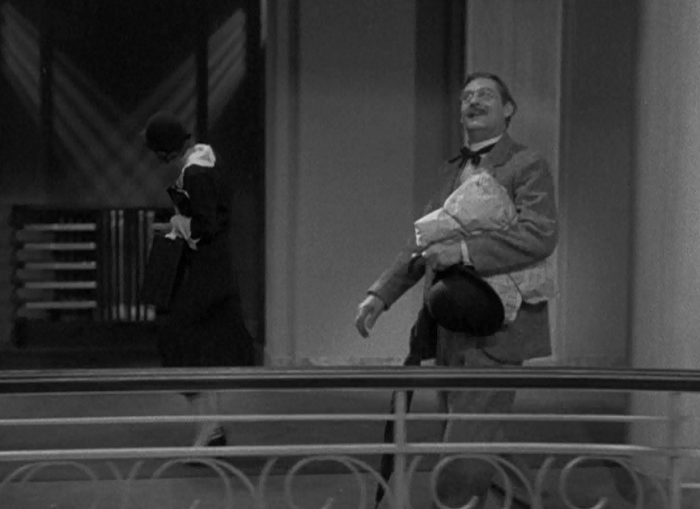
There’s a few early scenes where we have different character’s actions overlapping– Crawford in the back looking for the correct room while Barrymore admires the view with childlike joy. Again, to Goulding’s credit, moments like these sing.
- James Bernadelli over at Reelviews goes a bit into some more history of the stars, and proclaims that Grand Hotel hasn’t aged very well, but it’s entertaining enough.
- Jerry’s Armchair Oscars thinks that Scarface: Shame of a Nation was probably a better pick for the Best Picture Oscar for ’32, and while I do love Scarface it’s far too controversial of a movie to have ever snagged the top prize. Of course, Jerry also seems to hate Rouben Mamoulian and use the phrase ‘soup to nuts’ repeatedly, so I’m not sure he’s entirely altogether upstairs.
- DVD Savant runs down the details on the DVD and also talks about its problems with Lionel Barrymore’s character, which I wholly understand. There’s also some discussion of the Doctor here and how he relates to the Germany of the 1920’s.
- Grand Hotel just recently came out on Blu-Ray, so here’s DVD Beaver with screenshots and a complimentary review. I had the DVD for this go around, so I can’t comment on it myself.
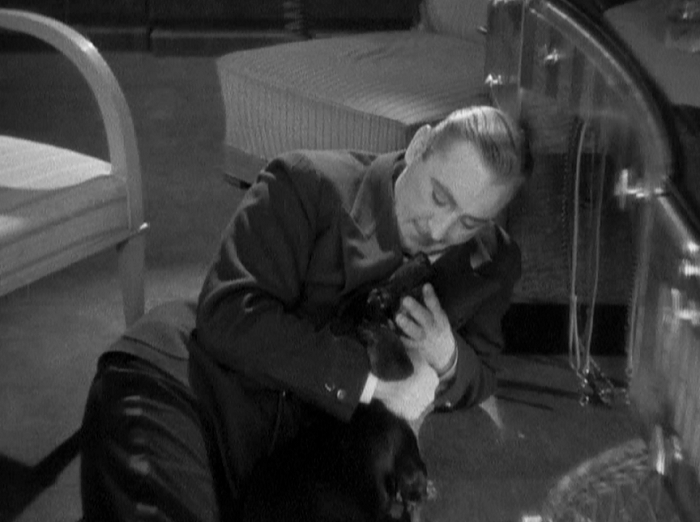
Meanwhile, here is the Baron with his dachshund, as I continue my quest to someday make that Pre-Code Puppies site. It will be quite scandalous, I assure you.
- The always admirable Goat Dog likes the film, and enthuses over the cast. I’d say he almost sounds giddy at points; Grand Hotel is one of those movies where that doesn’t surprise me.
- HappyOtter has all of the title cards in really nice high def. Check out the halos around Garbo and Crawford! Ridiculous!
- Speaking of Crawford, The Best of Everything: A Joan Crawford Encyclopedia reprints Mordaunt Hall’s contemporary review as well as showing off a rather spectacular set of posters for the film. There’s one portion in Hall’s review that boggles me, though. What do you think he’s referring to here? —
But it should be stated that in one scene he permits an extremely gruesome idea to creep in. This will probably be eliminated at some of the future exhibitions.
- Seriously, every single other review I read of this film opened by quoting the Doctor’s line about nothing ever happening at the hotel. Every. Single. One. I decided to lay off because I’m just that nice.
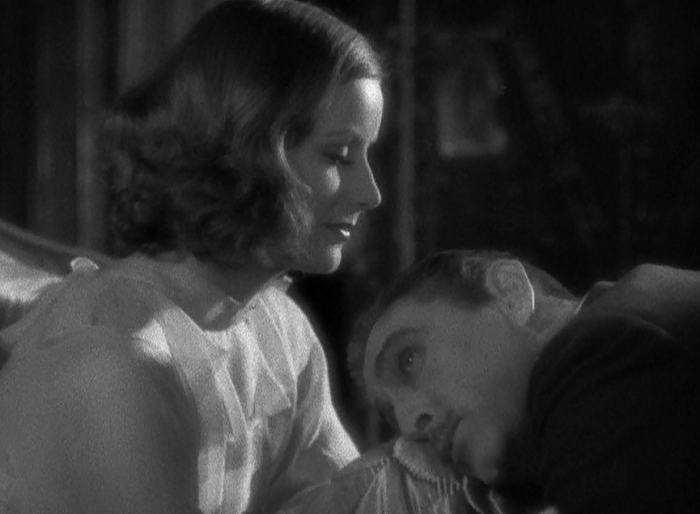
One last picture of these two since they’re such a pretty pair.
- One last piece of trivia for you tonight. According to the Checking Out documentary, the premiere for Grand Hotel at Grauman’s Chinese Theater was appropriately star studded. Garbo, being a recluse, didn’t show up, but the promoters promised the teeming crowd that she would make appearance after the show was over. After the movie, they got Garbo, though not in the way they wanted– it was Wallace Beery in drag. Believe it or not, the gag did not go over very well.
Availability
- This film is available on Amazon via DVD, Instant Video and Blu-Ray, and can be rented from Classicflix.





13 Comments
Judy · January 19, 2013 at 2:07 pm
Danny, I’m a big fan of this film and reviewed it a while back – I am interested in your comment that different reviewers warm to different characters. I suppose Lionel Barrymore may be my favourite in this, but I do love John Barrymore too and both Garbo and Crawford are great in it, though it is a pity they don’t have any scenes together.The featurette on the DVD I have mentions that Wallace Beery wanted to play the part with a German accent in order to distance the unsympathetic character he was playing from his normal screen persona, but, though this is pure speculation, I wonder if another reason for giving the villain of the piece a German accent was the rise of the Nazi party at the time (together with memories of the First World War.) Sorry you didn’t like this more, but I know there is divided opinion about this film.
Danny · January 19, 2013 at 6:04 pm
See, I find your take on the actors interesting, since I spent most of the movie in awe of John Barrymore and annoyed at Lionel who seemed a bit hammy. But I read probably three dozen reviews of the picture, and almost no one had the same opinion on all of the actors. It’s fascinating, and probably speaks to how well the movie turned out as any viewer can find one to be the most sympathetic and latch onto that.
And I like what you said about Beery; I didn’t catch any of that. It makes sense in that context, but it’s still weird watching the movie to realize that only one of them is even trying at an accent, and then once you learn that that was intentional…
And I was pretty borderline in on this. I think my big problem is that I’m not much for Garbo, so her scenes felt more excruciating than anything. Considering the other 30’s Best Picture winners I’ve been watching lately, Grand Hotel is splendid.
Emily · September 22, 2013 at 3:03 pm
I actually enjoyed Grand Hotel. It’s creaky melodrama to be sure, but that’s what makes it fun. (I really do wish Buster Keaton had been put in Lionel’s role. As much as I adore Lionel Barrymore, it would have been great if MGM had given Keaton decent material for once. I’d rather see GH with him than something as dull as Speak Easily.)
George · June 11, 2014 at 7:49 pm
Hi, there, Webmeister.
I’d read your query about the “gruesome scene” that was deleted, and wanted to relate to you a rumor I’d heard, many years ago, third- or fourth-hand. If the rumor holds any verisimilitude at all, I can see why the reviewer(s) called for the removal of the scene.
According to the rumor, shortly after the Baron’s death, a brief shot shows his beloved dachsund licking up his spilled blood.
You may make of this whatever you may.
Danny · June 16, 2014 at 11:28 pm
Wow, that’s pretty dark. I can see why it would be removed, especially considering how much of a shaft that poor dog gets later on down the line. But it fits in with the film’s complete lack of reverence for any institutions, including death. Thanks for sharing the rumor, I appreciate it!
george · June 18, 2014 at 2:57 pm
I have been looking for the continuity script. I did find the original script online, but it doesn’t make any mention of the deleted scene. In fact, the original script doesn’t contain many of the scenes we know that are actually in the movie, including all of the scenes with the dog.
The continuity script–if it still exists–explains exactly what the camera does, when and how.
I’ll let you know if I find it. It may be our only chance to solve this mystery.
Danny · June 24, 2014 at 10:43 pm
Interesting. I wish you the best of luck in finding it!
Marco · September 15, 2014 at 9:50 am
Thanks for your fantastic site, which is a great point of reference since I discovered pre-code films a few month ago. Let me just say that “”Menschen im Hotel” means “People at a Hotel”, not “A Book about A Hotel”. Greetings from Berlin!
Danny · October 8, 2014 at 6:53 pm
Ha, that was dumb of me. Fixed up above, and thank you!
drush76 · July 14, 2015 at 6:31 am
I would have given the Oscar to “FUGITIVE CHAIN GANG”.
Danny · July 16, 2015 at 11:06 am
Actually, because the year used to be split, Grand Hotel wasn’t up against Chain Gang. But Chain Gang should have won over Cavalcade easily.
Jeanne DeWeese · June 18, 2017 at 5:38 am
what was the dachshund’s name in Grand Hotel (real and movie name)?
Jonathan Tavaris · July 21, 2018 at 2:20 pm
I actually liked this one quite a bit. I thought Lionel Barrymore’s performance as Kringelein worked well – he’s a hopelessly meek, fussy old nerd confronting feelings and experiences familiar to everyone around him but new to him. Finally getting a taste of the good life is like a religious experience to him, and his hamminess is the manic zeal of the newly converted.
I think that the weak link is The Baron, not because of John Barrymore’s performance, but because the character is underdeveloped. He wasn’t established well enough for his suddenly falling in love with Garbo’s character to feel like it meant anything, and I was sure he was conning her until he actually gave her back the pearls. I also feel like something compelling could have been made out of why he’s too proud to accept money willingly given by a friend but not too proud to steal it, but this isn’t explored. Rather than the tragic character he’s apparently intended to be, he just comes across as a sentimental idiot.
On an unrelated note, Kringelein loudly belching when he’s drunk counts as a pre-code moment, right? I figure the code has to be the reason why in all those old WB cartoons characters say “burp” instead of actually burping.
Comments are closed.